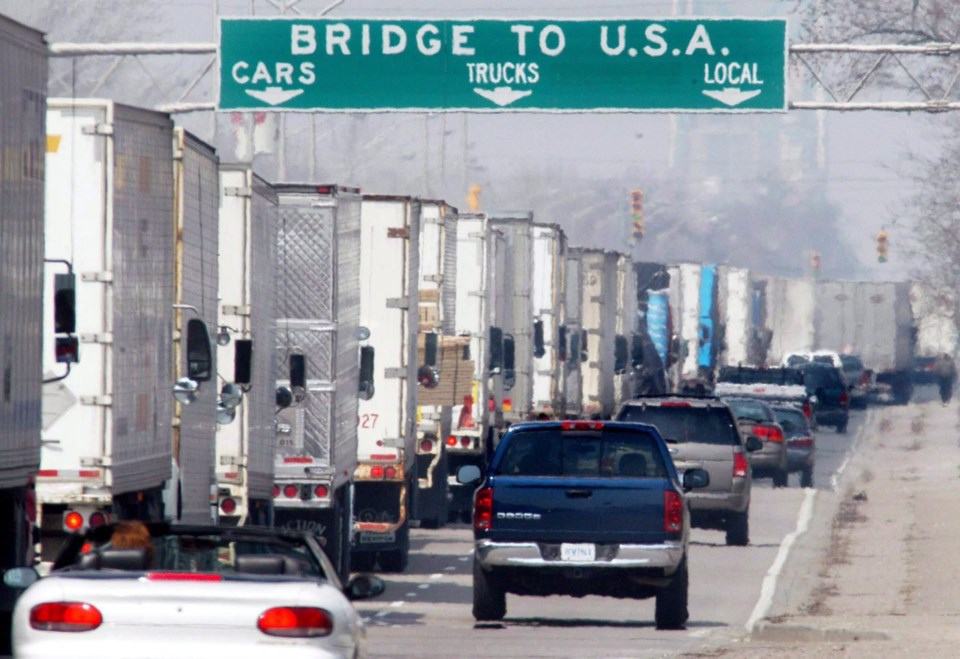MONTREAL — Truckers say the sweeping tariffs threatened by U.S. President Donald Trump would wreak havoc on their industry as trade between Canada and the United States takes a hit.
“If these tariffs came in at those levels for a prolonged period, this could be the final nail in the coffin for many trucking fleets,” said Stephen Laskowski, president of the Canadian Trucking Alliance.
“It’s a grim picture.”
The 25 per cent duties on nearly all Canadian imports to the U.S. — now delayed until early March — would mark the biggest trade shock north of the border in nearly a century, according to RBC Economics. A last-minute postponement, announced by Prime Minister Justin Trudeau and Trump late Monday afternoon, came after the president had repeatedly said the tariffs were slated to kick in Tuesday.
In response to the initial threat, Ottawa had vowed equal tariffs on $155 billion worth of American-made goods, ranging from beer and cheese to desk chairs, drones and dishwashers.
Such a move would "strangle" the trucking industry, said Lisa McEwan, vice-president at Hemisphere Freight, a customs brokerage and freight forwarder.
"People will maybe not want to spend that $10 for an avocado or a grapefruit."
The decrease in cross-border shipping triggered by a drawn-out trade war would lead to a recession, the Bank of Canada and other economic forecasters have said. Laskowski said the load would fall particularly hard on truckers, many of whom are already struggling due to weaker consumer demand.
“It’s hypercompetitive,” he said of the ailing sector. “When the economy catches a cold, the trucking industry catches pneumonia.”
Some 120,000 Canadian truckers carry cross-border shipments, he said. Hauls to the U.S. make up about two-thirds of all Canadian truckloads, according to transportation tech firm Arrive Logistics.
In 2023, truckers from both countries drove US$435.7 billion in freight across the border, according to the U.S. Department of Transportation, with consumer products, motor vehicles and parts, and electronics among the biggest items. Truck cargo comprises 60 per cent of trade between Canada and the U.S.
Especially vulnerable is the manufacturing sector, which includes tens of billions of dollars in auto parts and vehicles borne by truck to the U.S. from Canada.
The likely decline in overall trade would see more drivers turning to the domestic trucking market, said Joseph Khoueiry, whose company Fabreville Inc. operates five tractor trailers between Toronto and Montreal. As the number of truckers vying for shipping contracts rises, the prices they charge would fall, denting the bottom line.
“They’re going to compete with us. It’s going to affect the rate, it’s going to eat our margins,” he said.
Khoueiry added that replacement parts for his fleet could also see price hikes from the 25 per cent tariff slapped on auto imports from the U.S. — paid for with an even weaker Canadian dollar. Trading for around 68 cents US as of Monday, the loonie has sunk to its lowest level since 2003, with currency experts forecasting further declines if markets expect the tariffs to settle in for the long haul.
The trucking alliance has called on premiers to lift interprovincial trade barriers, an intractable issue that has frustrated Canadian businesses for decades.
Laskowski also said the federal government should reconvene Parliament to deal with the crisis.
“Our leaders need to get together and develop solutions,” he said.
Others were more sanguine about the situation.
Ted Daniel, CEO of Bolton, Ont.-based Titanium Transportation Group, said the lower loonie might persuade some American clients to keep buying Canadian.
"Our customers are going to dictate what the impact is of this," said Daniel, whose fleet counts 800 semi trucks.
"There's no movement from customers yet," he said Monday afternoon.
“Just take it day by day.”
This report by The Canadian Press was first published Feb. 4, 2025.
Christopher Reynolds, The Canadian Press



